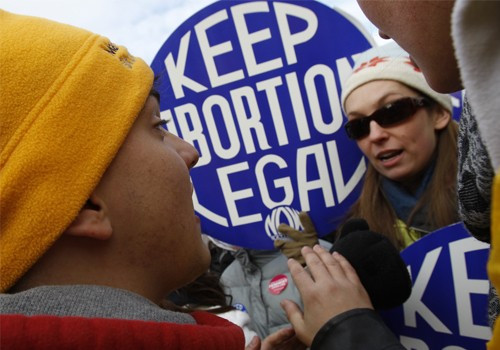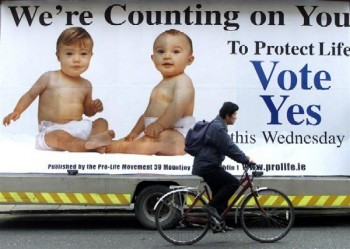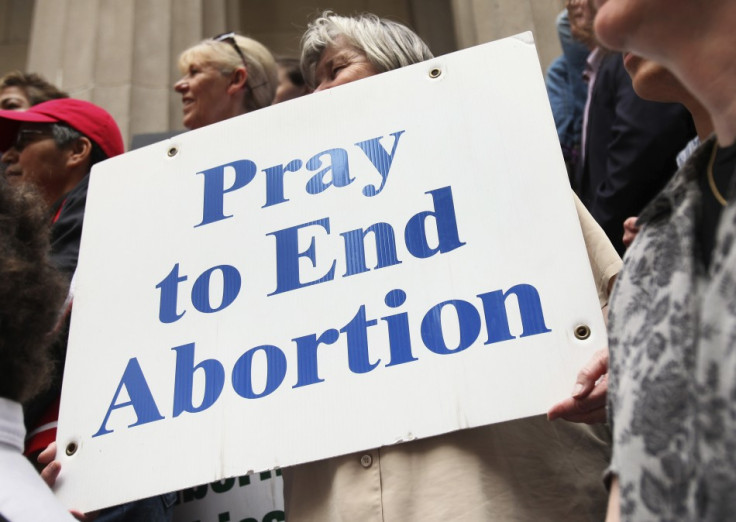Abortion in the UK: Why Women Deserve Impartial Advice

For some, finding out you are pregnant is a moment of joy – for others, it brings anguish, anxiety and distress. When making the decision of whether to terminate a pregnancy, impartial, non-judgemental advice is paramount.
Regardless of pro-choice or pro-life beliefs, abortion is legal in the UK. The procedure can be carried out in the first 24 weeks, and in exceptional circumstances, it can be carried out afterwards if the pregnancy poses a risk to the woman's life or if the foetus has a risk of being severely physically or mentally handicapped.
This week, it was revealed that women are being fed false advice by a network of unregulated counsellors. In an investigation led by the Daily Telegraph, undercover reporters were told that having an abortion can turn them into child sex abusers, in two Crisis Pregnancy Centres in London and Luton. This advice, given free to potentially vulnerable women, is a sure-fire way to inflict psychological distress.
One reporter was told there was an "increased statistical likelihood of child abuse" after an abortion, because the procedure "broke natural barriers that are around the child that you don't cross".

The counsellor, known as Annabel, added: "There's a statistical increase. I'm not saying it's many people, it's still a very low percentage, but it seems like there is a correlation between the two. I think it's just because it can really confuse relationships with children."
Another unnamed counsellor said there was a link between abortion and breast cancer. She said: "All them cells in your breast that were going nicely forward getting prepared to make milk, they are all sent in reverse and that's when it starts mutating."
Dr Sarah Wollaston, a Conservative MP and a former GP, has called for a review of the way abortion counselling is provided. She said: "Women who go to a centre which purports to give impartial advice that is fundamentally anti-abortion in its stance, but doesn't openly say so, is totally unacceptable."
"Now is the time for the Secretary of State [Jeremy Hunt] to order a review of the whole abortion counselling process."
This revelation is difficult to accept on several levels. The first, that women are being handed out biased advice, fuelled by personal and religious agenda. The second is that the so-called "counsellors" exist in a network of centres among medical groups and charities that offer legitimate advice.
In the investigation, it was even reported that women are being told that an abortion would encourage their partner to end their relationship. Tactics of blatant manipulation are being passed as safe, medical advice.

At the British Pregnancy Advisory Service, three main topics to be discussed in a pre-abortion counselling session include continuing the pregnancy and becoming a parent, continuing the pregnancy and pursuing adoption, or terminating the pregnancy. The risks must be discussed, although they are rare.
According to the NHS, haemorrhage occurs in around one in every 1,000 abortions, while damage to the cervix occurs in no more than 10 in 1,000 procedures. Damage to the womb occurs in up to four in every 1,000 abortions. However, if the termination is carried out between 12 and 24 weeks of the pregnancy, the risk is reduced to less than one in every 1,000 abortions. Fertility should not be affected if there are no complications in the procedure. The Royal College of Obstetricians and Gynaecologists confirmed that breast cancer and child sex crimes are entirely unrelated to abortion.
Speaking to the IBTimes UK, a spokesperson from the BPAS, said: "As a charity that cares for women with unintended pregnancies, we see the distress that some crisis pregnancy centres can cause women. The centres need to be transparent about who they are and what they believe, and that they are not regulated healthcare services.
"In our experience, most women considering an abortion would be uncomfortable in a service with an intense ethical objection to one of their options. Pregnant women should be given evidence-based, factual advice about their options and deserve to be supported by non-judgemental services."
Another misconception often spread is that abortion inflicts pain on a first-trimester foetus. However, pain reception requires a neocortex, which is not formed until early in the third trimester. Similarly, it is argued that foetuses become conscious as early as 8 weeks into the pregnancy. This is not true, as foetuses develop a brain stem at 7 weeks, but are not capable of consciousness until the third trimester. Many remain unconscious until birth.
Tracey McNeill, Marie Stopes International's Senior Vice President, told IBTimes that women seeking support should not be subjected to "bogus claims and scaremongering".
She said: "We would advise women to check that the places they are turning to for support are regulated by the Care Quality Commission - which all abortion providers are - and whether they also can refer you for independent counselling.
McNeil added: "Marie Stopes International, for example, is regulated by the Care Quality Commission and works in partnership with the Department of Health and the British Association for Counselling & Psychotherapy to ensure that the quality of our services, counselling and the support we offer women is impartial, non-directive and of the highest possible standard."
By regulating Crisis Pregnancy Centres or ensuring trained and impartial medical advice is also readily available, we can eliminate the myths that cause such distress. Whether pro-choice or pro-life, women deserve facts.
© Copyright IBTimes 2025. All rights reserved.






















